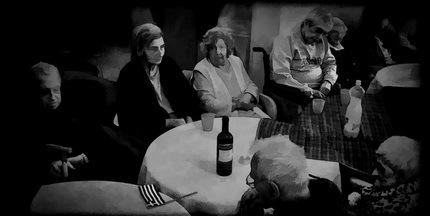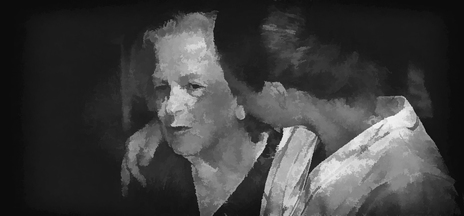The last moons / Le ultime lune
Furio Bordon
Play Summary
A very old man decides to spend the rest of his life in a home for the elderly (retirement home).
Because the man’s name is not mentioned in the play, he will be referred as HUSBAND throughout the Psychotheatrological Analysis.
The HUSBAND lives together with the family of his son.
The son’s name is not mentioned in the play, so he will be referred simply as SON.
The final hours before the HUSBAND departs for the retirement home, he converses with the vision of his wife, who has died 40 years ago.
Lastly, because the wife does not have a name in the play, she will be referred simply as WIFE.
Throughout the dialogue between the HUSBAND and the WIFE’s vision, we can see clearly the undying love they still have for each other, a love which never left any room for their son (SON).
Since the WIFE died, the HUSBAND is drawn to himself, secluded inside his memories. Because of his high education, he dwells into a philosophical quest, which is not targeted towards developing his creativity and connecting with his fellow human beings, in order for him to enjoy life. On the contrary, his philosophical undertakings contain anger and hatred towards the very notion of human existence.
The HUSBAND becomes critical of everything and dysfunctional. He goes on to live with his son (SON) and his family (wife and two children), but he is completely estranged and isolated from them.
It is clear that even in the last minute, he waits for his son (SON) to take initiative and not let him go away from home.
The WIFE appears in order to talk to HUSBAND’s heart and help him realize his feelings.
The ultimate goal of the WIFE is for the HUSBAND to express his feelings towards their son (SON), without any egocentric stubbornness.
The HUSBAND rejects the WIFE’s suggestions, hence the WIFE is unsuccessful in achieving her goal. The result is that the HUSBAND remains barricaded behind his egocentric defenses against his son (SON).
The egocentric symbiotical relationship that the HUSBAND has with the WIFE remains intact and unbroken even in the final moment.
At the retirement home called ‘Villa Glikeria’, he develops once again an egocentric symbiotical relationship, this time with a basil plant.
He takes it upon himself to see the plant grow and he cares for it with affection, love and admiration.
He converses solely with the plant and denies to connect with the other residents.
He becomes once again estranged and isolated from the real environment of the retirement home, by listening, as he always did, to Bach with the headphones his son (SON) gave him.
In this final stage of his life, he experiences the ideal egocentric symbiotical relationship with the basil plant. Estranged and isolated from the outside world, he feels emotionally complete and to the eyes of a stranger he seems in peace and in reconciliation with the stages of Life.
Because the man’s name is not mentioned in the play, he will be referred as HUSBAND throughout the Psychotheatrological Analysis.
The HUSBAND lives together with the family of his son.
The son’s name is not mentioned in the play, so he will be referred simply as SON.
The final hours before the HUSBAND departs for the retirement home, he converses with the vision of his wife, who has died 40 years ago.
Lastly, because the wife does not have a name in the play, she will be referred simply as WIFE.
Throughout the dialogue between the HUSBAND and the WIFE’s vision, we can see clearly the undying love they still have for each other, a love which never left any room for their son (SON).
Since the WIFE died, the HUSBAND is drawn to himself, secluded inside his memories. Because of his high education, he dwells into a philosophical quest, which is not targeted towards developing his creativity and connecting with his fellow human beings, in order for him to enjoy life. On the contrary, his philosophical undertakings contain anger and hatred towards the very notion of human existence.
The HUSBAND becomes critical of everything and dysfunctional. He goes on to live with his son (SON) and his family (wife and two children), but he is completely estranged and isolated from them.
It is clear that even in the last minute, he waits for his son (SON) to take initiative and not let him go away from home.
The WIFE appears in order to talk to HUSBAND’s heart and help him realize his feelings.
The ultimate goal of the WIFE is for the HUSBAND to express his feelings towards their son (SON), without any egocentric stubbornness.
The HUSBAND rejects the WIFE’s suggestions, hence the WIFE is unsuccessful in achieving her goal. The result is that the HUSBAND remains barricaded behind his egocentric defenses against his son (SON).
The egocentric symbiotical relationship that the HUSBAND has with the WIFE remains intact and unbroken even in the final moment.
At the retirement home called ‘Villa Glikeria’, he develops once again an egocentric symbiotical relationship, this time with a basil plant.
He takes it upon himself to see the plant grow and he cares for it with affection, love and admiration.
He converses solely with the plant and denies to connect with the other residents.
He becomes once again estranged and isolated from the real environment of the retirement home, by listening, as he always did, to Bach with the headphones his son (SON) gave him.
In this final stage of his life, he experiences the ideal egocentric symbiotical relationship with the basil plant. Estranged and isolated from the outside world, he feels emotionally complete and to the eyes of a stranger he seems in peace and in reconciliation with the stages of Life.
Theatrological Elaboration: Ariel Konstantinides
Psychotheatrological Analysis: Ariel Konstantinides/Panos Mavitzis
Psychotheatrological Analysis: Ariel Konstantinides/Panos Mavitzis


